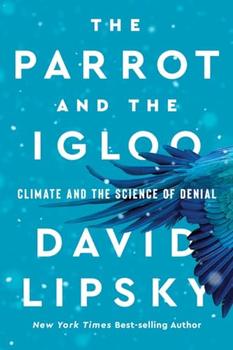Summary | Excerpt | Reviews | Beyond the Book | Readalikes | Genres & Themes | Author Bio

Climate and the Science of Denial
by David Lipsky
Benjamin Franklin left one Boston performance in a state. He immediately tried to put his hands on anything electrical. A primitive electric storage system—wire in water; this was called a Leyden Jar—had been introduced. Franklin showed off Leyden jars at his printing shop: throwing sparks, drawing crowds. Franklin created a hopping metal spider, cooked turkeys ("birds killed in this manner eat uncommonly tender"), shocked friends. "If there is no other use discovered of electricity," Franklin wrote, "this however is considerable."
Which is what sent Franklin into the Philadelphia rain with a kite, a key, and silk, an insulator. As failure insurance, Franklin brought along his son: If the experiment didn't come off, Franklin could always say the kite was the boy's. Two practical aims: He meant to demonstrate that the electricity generated by static, and the thunderous forks that sometimes singed trees and rooftops, were cousins; that here was a potentially awesome force. As churches, the tallest buildings, were often struck by lightning, Franklin's second aim was to popularize the lightning rod. Franklin became America's first celebrity scientist. Yale and Harvard offered honorary degrees. A Russian named Georg Richmann tried to repeat his work. The lightning burst Richmann's left shoe and pressed a small red circle into his forehead. Richmann became a casualty and a novelty: the first person electrocuted by love of science.
The technology proceeded by fits and starts. Also accidents and grudges, progress charted with entries in the dictionary. In 1781, an Italian professor named Luigi Galvani discovered that frogs' legs—relieved from their donors—would still kick under application of a current. Galvani's belief was that even the dead continued to generate some form of animal electricity. Alessandro Volta, his rival, thought this was just ridiculous. To demonstrate the ridiculousness ("What is left," he wrote, "of the animal Electricity claimed by Galvani?"), Volta invented a surer way to generate and store electricity: The voltaic pile, the battery. But there they are, preserved together in the dictionary—the conventioneers' hall where everyone shakes hands after death. A current that moves is "galvanic." The current is the volt.
Michael Faraday steps into the narrative like a hero out of Dickens: rough childhood, smooth features, virtuous character, shy achievement. (In the old ABC drama Lost, which featured a scary electromagnetic island, the sole character to have any idea what was going on is named Faraday.) Faraday, a London blacksmith's son, left school at twelve. He put in seven years as a bookbinder's apprentice. And it's funny that electricity, which would take a planet of readers and redirect them toward YouTube and touchscreens, was perfected by somebody from the trade. In 1812, a customer gave Faraday his tickets to a series of chemistry lectures. Faraday attended and was smitten. He composed a kind of love letter, using the tools of his shop—took perfect notes, bound them into a volume, presented the book to the lecturer, who happened to be head of the Royal Institute of Science.
Faraday became his apprentice—then began to outshine everybody. In 1822, Faraday wrote four words in his notebook: "convert magnetism into electricity." It took nine years. His solution was to rotate a metal disk inside the arms of a horseshoe magnet. Since the process was dynamic, his machine was called a Faraday dynamo, which meant another new word.
By 1831, electricity could be stored, it could be generated. It still didn't have a use.
samuel morse was born—oddly—a mile from Ben Franklin's birthplace. He arrived in 1791, one year after the big Philadelphian departed, as if the tech were passing a sort of baton. Morse liked to draw—as a kid, he scratched a portrait into a school cabinet, got yelled at. Once he was famous, that chest became a relic.
Excerpted from The Parrot and the Igloo by David Lipsky. Copyright © 2023 by David Lipsky. Excerpted by permission of W.W. Norton & Company. All rights reserved. No part of this excerpt may be reproduced or reprinted without permission in writing from the publisher.
Your guide toexceptional books
BookBrowse seeks out and recommends the best in contemporary fiction and nonfiction—books that not only engage and entertain but also deepen our understanding of ourselves and the world around us.